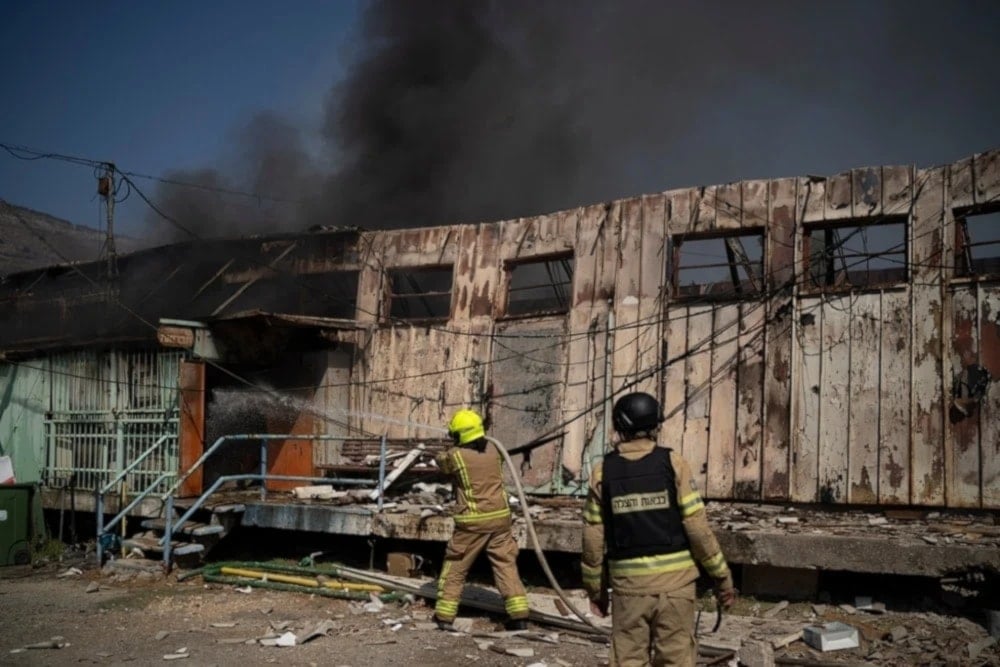Hezbollah fire causes widespread destruction in northern 'Israel'
Israeli media report on extensive damage in northern settlements due to Hezbollah fire, with over 8,800 houses, 7,000 vehicles, and around 300 agricultural sites destroyed.
-

Firefighters work to extinguish a fire after a rocket, fired from Lebanon, hit a local municipality storage in Kiryat Shmona, northern occupied Palestine, on September 24, 2024. (AP)
Israeli media, citing the Israeli Tax Authority, reported significant damage in the northern settlements of Manara, Shtula, Kiryat Shmona, Zar'it, Nahariya, and Shlomi.
The revelations come despite "Israel" imposing strict military censorship to cover up and conceal the damage and losses suffered in the north, as Hezbollah continues to fire dozens of missiles and drones daily.
The Tax Authority also indicated that there is extensive, unreported damage elsewhere in the region, due to the fact that the settlers have been evacuated or because the injuries are in areas that cannot be entered based on the Israeli army's instructions.
According to the authority, Hezbollah fire has completely damaged 9,000 buildings and over 7,000 vehicles in these northern settlements.
Meanwhile, Israeli newspaper Yedioth Ahronoth confirmed that the destruction in Kiryat Shmona is extensive, with repairs to the damaged schools alone expected to take four months.
The newspaper also noted that in the border towns with Lebanon, nearly every building has been damaged, with most houses requiring either repairs or demolition.
In a related context, over 8,800 homes have been reportedly destroyed in northern "Israel", along with more than 7,000 vehicles and approximately 300 agricultural sites damaged.
David Azoulay, the head of the settlement council in Metulla, reported that 70% of the homes in Metulla have been destroyed, with the rehabilitation process expected to take at least two years.
Moreover, an expert revealed to the newspaper that Hezbollah's focus on targeting security and military industries facilities caused many of them to close and forced the Israeli military to evacuate barracks and bases. Elbit, Rafael, and other factories came under direct hits by Hezbollah drones, so they were closed and their operations were transferred to new secret centers in central "Israel". This shift caused the termination of about 200, knowing that they usually accommodate more than 650 workers and employees.
This comes shortly after Israeli media reports indicated that the total damages in northern settlements have surpassed 5 billion shekels, equivalent to more than $1.3 billion.
Northern Israeli settlements chiefs: Truce gives Hezbollah upper hand
As speculation grows about a possible ceasefire agreement in Lebanon, fueled by media reports and cautious remarks from officials in Beirut, voices of dissent are growing within the Israeli occupation, particularly from northern settlement chiefs.
Many are labeling the potential deal as an Israeli "surrender agreement" to Hezbollah.
David Azoulay, the head of the settlement council in Metulla, located in the al-Jalil Panhandle, described the situation as "a heartbreaking settlement" and a "surrender" by the Israeli government to Hezbollah.
Azulay further stated, "As long as there is no real security here, we will not return."
In addition, Azulay reported that 70% of the homes in Metulla have been destroyed, with the rehabilitation process expected to take at least two years.
He has lately dismissed claims that the Israeli occupation had achieved its war objectives, calling such statements "lies". He asked, "Why is the most right-wing government in Israeli history heading toward a surrender agreement with Hezbollah?"
Similarly, Avichai Stern, mayor of Kiryat Shmona, considered a possible deal as Israelis, not Hezbollah, "raising the white flag."
Speaking to Channel 13, he expressed concern that such an agreement could lead to a repeat of the October 7 scenario in northern occupied Palestine. He urged Israeli leaders to avoid putting settlers in the north at risk, warning that they could become "the next hostages." Stern added, "I don't understand how we've gone from total victory to total surrender."
Eitan Davidi, head of Margaliot, said, “I want to live in peace," which requires, according to him, creating a buffer zone between the northern settlements and Lebanon, two to four kilometers long, “with no entry or exit from it."
Yossi Hadad, head of the regional council of Mateh Asher in western al-Jalil, cautioned that signing the agreement could result in a stronger Hezbollah in the coming years, saying, "We will pay in blood for this."
Benny Ben Muvhar, leader of the Mevo'ot HaHermon regional council, declared that settlers would not return to the north under such an agreement, which undermines one of the war's stated objectives.
'Settlers cannot return safely'
Moshe Davidovich, chair of the Frontline Settlements Forum along the border with Lebanon, criticized the Israeli government for making decisions "over our heads." He argued, "We cannot return to the north safely under such a deal. We want to live in safety, and the government has failed to provide that."
In comments to Israeli Channel 12, Davidovitch described the impact of Hezbollah's operations on northern settlements, saying, "The roads are destroyed, and the war has devastated livelihoods, the economy, tourism, and agriculture."
Eli Dokursky, mayor of Kiryat Bialik near Haifa, echoed this frustration, expressing the settlers' sense of abandonment. He said, "I hope the hardships we endured over the past two months, with Haifa facing heavy fire, weren't for nothing."
Israeli media has also been critical, with Channel 12 referring to the agreement as a "shield for Hezbollah," while Colonel (Res.) Gabi Siboni conceded that Hezbollah's presence and infrastructure, even south of the Litani River, would remain intact and that "no one will dismantle it."
These criticisms reflect widespread dissatisfaction among settlers and military experts who feel betrayed by Prime Minister Benjamin Netanyahu's declaration of "total victory". Many have directly accused him of abandoning northern communities, stating, "You've left us with empty promises. The blood of Israelis in the north will be on your hands."

 6 Min Read
6 Min Read








